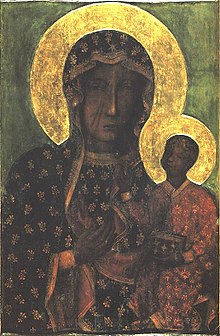Ezili Dantor
Ezili Dantor | |
|---|---|
 The most common depiction of Erzulie Dantor is derived from this variant of Black Madonna of Czestochowa | |
| Loa of Motherhood | |
| Venerated in | Haitian Vodou, Louisiana Voodoo, African mythology, Folk Catholicism |
| Attributes | Black woman holding a child, knife, jewelry, three silver rings, gold, blue, green, red |
| Patronage | Haiti, healing, motherhood, protection from violence, lesbians, homosexuals, wealth, strength, magical power, vengeance, single women |
Ezili Dantor or Erzulie D'en Tort (also spelled Erzulie with Danto or Danthor) is the Petro nation aspect of the Erzulie family of lwa, or spirits in Haitian Vodou. Ezili Dantor is considered to be the lwa of motherhood, single motherhood in particular. She is most commonly represented by the image of Black Madonna of Częstochowa whose origins are believed to be in copies of the icon of the Black Madonna of Częstochowa, brought to Haiti by Polish army soldiers sent by Napoleon to subdue the Haitian Revolution, but instead settled in Haiti, in particular the town of Cazale [1] See Polish Haitian Other depictions of Ezili Dantor include the Black Madonna, as well as Our Lady of Lourdes, Saint Barbara Africana and Our Lady of Mount Carmel.
Worship
Ezili Dantor is associated with the black creole pig of Haiti, her favorite animal sacrifice which was made to her at the famous Vodou ceremony at Bois Caïman that inaugurated the Haitian Revolution,[2] and the colors gold and blue, sometimes green and also red to signify that she is a Petro lwa. She is a dark-skinned and scarred warrior-mother like the Dahomey Amazons or Mino meaning "Our Mothers" in the Fon language. Her favorite offerings include: a fried pork dish known as griot, creme de cacao, rum, Florida Water perfume
References
- ^ "Re Polish presence in Haiti : Judson comments"—Discussion on webster.edu.
- ^ Ogando, Ismael. "Altar; A Historical Archive Revision. Port-au-Prince, Haiti, 2015".
{{cite news}}:|access-date=requires|url=(help)
